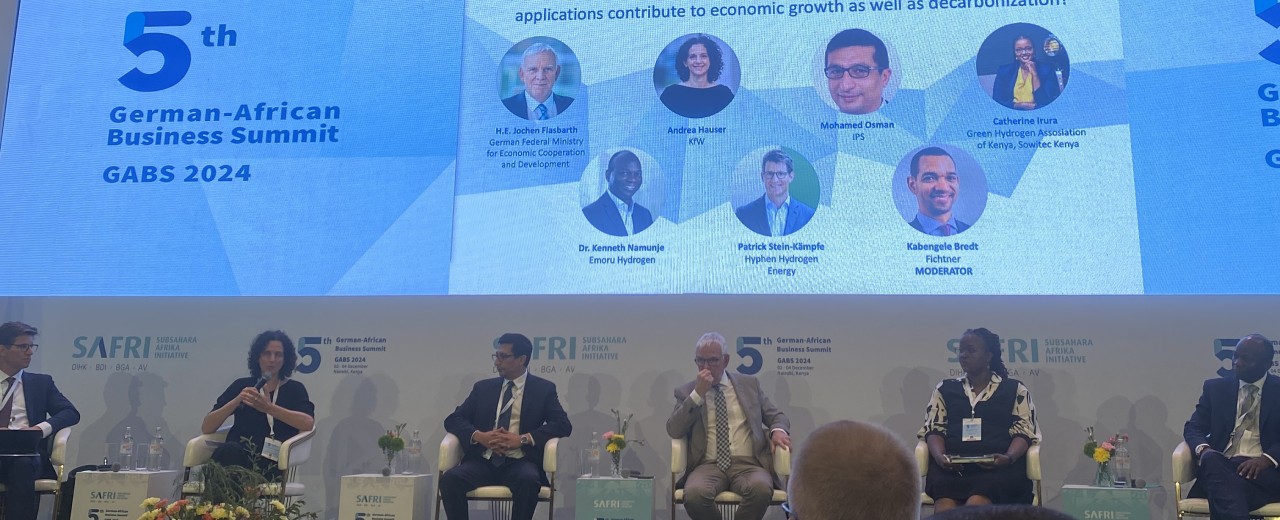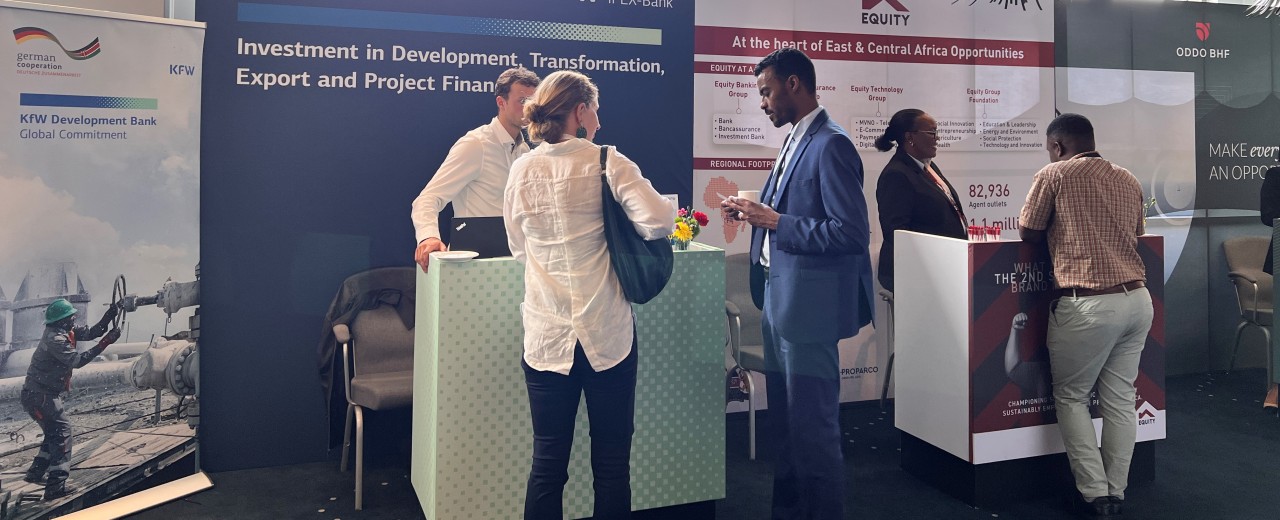News from 2024-12-06 / KfW Development Bank, KfW IPEX-Bank, DEG
Africa - continent of opportunities
The German-African-Business-Summit (GABS) shows perspectives for a sustainable business cooperation

For the fifth time, German and African representatives of the private and public sector gathered to strengthen their collaboration – especially concerning agro-processing and value chains, renewable energies, focusing on green hydrogen, vocational training, and cooperation on raw materials.
The German-African Business Summit, which took place this year from 2nd to 4th December 2024 in Kenya’s economic capital Nairobi, is Germany’s most important business conference event in Africa. It is supported by the Sub-Saharan Africa Initiative of German Business (SAFRI) and brought together 900 leading business and government representatives from Germany and Africa. KfW was represented by the three banks focusing on international finance, being KfW Development Bank, DEG and KfW IPEX-Bank.
Andrea Hauser, Member of the Management Committee of KfW Development Bank states: “We at KfW Development Bank are delighted to be part of this year's GABS in Nairobi. At this event connections are made and the spirit of collaboration and innovation between business and government leaders is furthered, which is crucial for sustainable development - in Europe as well as in Africa.”
“Supporting German companies abroad is in the DNA of KfW IPEX-Bank. We are therefore proud to be part of the German African Business Summit this year to further strengthen our business relationships in Africa", explains Belgin Rudack, Managing Director of KfW IPEX-Bank.
Thorsten Metz, office director KfW IPEX-Bank for Sub-Saharan-Africa adds: “All three entities of KfW that are active in Africa have been acting as One Bank to support both German companies abroad and local economies in Africa. We as KfW IPEX-Bank are ready to finance European companies with tailor-made financings for their exports and investments in such sectors as infrastructure, mobility and mining in Africa.”
“The GABS has shown more than ever that the business relationships between Germany and Africa are of utmost importance to both sides. DEG has been an active player to strengthen these given our wide offer of long-term financing and support programs to German as well as African companies”, states Barbara v. Toll, Regional Director for DEG in East Africa. “For example, we had the opportunity to highlight the German Desk, a cooperation format with local banks addressing the particular needs of German firms and their local partners. DEG’s subsidiary DEG Impulse, together with the Agency for Business and Economic Development (AWE) and GIZ, launched the Partners in Transformation desk here in Nairobi to inform about and promote BMZ financed support programs.”
Finance is key to supporting private sector investments
This year's summit focused on the opportunities and requirements of financing in Africa. DEG was represented at the panel discussion “Finance in Africa: How can the change of risk perception and the modernization of financing mechanisms elevate African German business relations?” by Barbara v. Toll. The panel elaborated on the importance of tailor-made financing instruments adapted to the African realities to increase investments on the African continent as well as the need for de-risking instruments also for banks in order to provide such.
Another panel highlighted the vast financing offers DEG has at hand. During a lively fishbowl discussion thereafter, concrete needs of African and German businesses were discussed. The core business financing and transformational offers, the ImpactConnect and develoPPP program (in cooperation with the BMZ) as well as the German Desk Initiative (supported by the BMWK) by DEG all attracted high attention.
Future prospects on Energy
Other topics of the GABS were the future prospects for energy with a focus on hydrogen, recruiting skilled workers for Africa and for Germany, digitalization and innovation as well as German-African cooperation in the raw materials sector. At an energy panel experts from both the public and the private sector discussed how Africa’s geothermal, wind, and solar resources can be leveraged to produce green hydrogen and its derivatives for agricultural and industrial applications as well as export.
On this panel KfW Development Bank was represented by Dr. Andrea Hauser. She pointed out the importance of green hydrogen – by using renewable energies - for the global decarbonization and the natural solar and wind resources all over African markets, making them ideal partners for hydrogen projects. And thus, creating value chains and trade networks between the continents. To overcome obstacles in the funding of these projects, KfW introduced the PtX platform, which bundles KfW’s various funding and financing instruments. These include KfW Development Bank, DEG and KfW IPEX-Bank, all of which are active on the continent. Moreover, the platform coordinates and implements tailor-made financing for projects along the entire PtX value chain, such as the production of clean energy or the transport and use of green hydrogen and its derivatives. Andrea Hauser concluded that in globally exploring the green hydrogen sector, there is potential to global decarbonization and economic development.

Kenya as an African pioneer in green energy
Kenya is pursuing ambitious goals in the energy sector: On its way to achieve the “Vision 2030” – to cover 100% of electricity generation from clean energy resources by 2030 - the country is already a pioneer in green energy on the African continent. As of now, Kenya’s electricity is already mainly based on geothermal and hydropower. However, the country’s current capacity of 3,200 MW has only reached a share of the local geothermal potential, which is estimated at over 10,000 MW.
To support Kenya in achieving the Vision 2030, KfW Development Bank is promoting the construction of geothermal power plants. To name one example: the development of a new geothermal field near Baringo-Silali including the construction of access roads, water supply and drilling. The project is subsidized by KfW Development Bank with a low-interest loan of 80 million Euros and with around 30 million Euros as part of the debt-for-climate swap.
These construction measures will provide employment opportunities for the local population and improve the socio-economic situation through infrastructure measures, education and health programmes and other development initiatives. The first geothermal power plant promoted by KfW was connected to the grid in 1981 already.
In addition, DEG has extended and arranged long-term finance of around 250 million USD to three privately owned renewable energy producers in the geothermal, wind and solar sector. Thereby, DEG is supporting the production of around 500 MW of renewable energy in Kenya.

Share page
To share the content of this page with your network, click on one of the icons below.
Note on data protection: When you share content, your personal data is transferred to the selected network.
Data protection
Alternatively, you can also copy the short link: https://www.kfw-entwicklungsbank.de/s/enzBWrMC.DLAA
Copy link Link copied